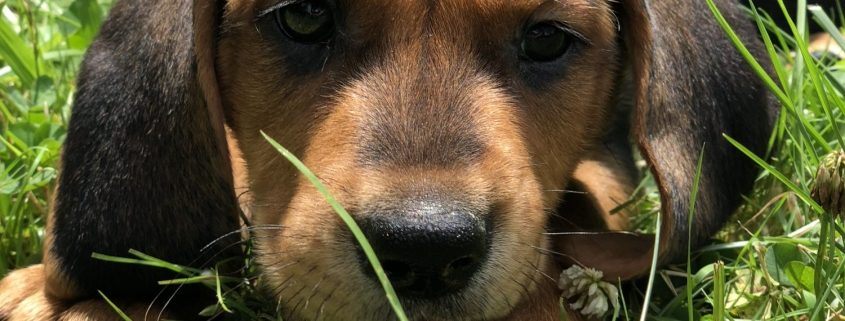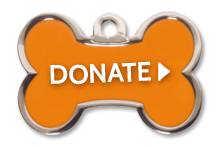Ask Crystal: Teaching a Puppy Manners
Welcome to “Ask Crystal,” where you can ask your pet behavior questions! You can submit your question for Crystal at the bottom of the page!
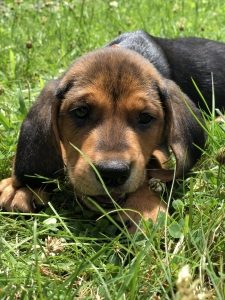
Dear Crystal,
I really need help. I have a 16-week-old lab/ hound. She keeps peeing and pooping in the house. And she likes to bite a lot. Any suggestions?
Thank you,
Puppy Problems
Dear Puppy,
Sounds like you got a puppy alright. They are little pooping, peeing machines with sharp teeth! Good thing they are so adorable because they sure are messy and a lot of work. It’s definitely not all fun and games when you get into the nitty gritty of puppy training.
The key to fast and efficient house training is avoiding as many accidents as possible by constant supervision and confinement when supervision is not possible. Housetraining is a numbers game. You have to have many more instances of the puppy going potty outside and being rewarded than accidents inside the house. The more times you can reward her for going outside and prevent her from going inside, the more likely she will want to go outside to potty.
The number one mistake I see people making with puppies is giving them way too much freedom. A puppy cannot be allowed to roam around the house without someone watching them. Until the puppy is house trained, they must always be in the same room with a person who is watching them so that they can see the signs that the dog needs to eliminate. If you watch your dog enough you will start to learn their particular signs. That might be suddenly sniffing the floor, circling, becoming agitated, moving away from you, or squatting. Ideally, you would get her outside before she actually starts eliminating. If you do catch her starting to go, clap or say “hey” or something to interrupt it and take her outside.
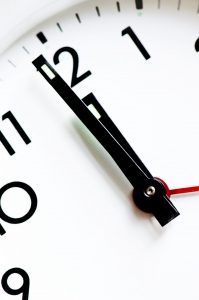 A regular schedule is of taking the puppy outside is critical. The more opportunities you provide to go outside the less likely she will need to go while inside. You should take her out at least once at hour and/or upon waking, after eating, after playtime, before leaving, when coming home and before bed. When you do take her outside, try to be all business until she goes. Take her to the same quiet spot and stand there ignoring her until you see those signs she is about to go and give her a cue “go potty”. As soon as she starts going, say “yes” and feed her a treat when she is done. It should be an amazing meaty treat to really get the point across. Then you can give her a walk around or play session so that you aren’t taking her right inside after. Some dogs will delay going potty if they think they have to go back inside after.
A regular schedule is of taking the puppy outside is critical. The more opportunities you provide to go outside the less likely she will need to go while inside. You should take her out at least once at hour and/or upon waking, after eating, after playtime, before leaving, when coming home and before bed. When you do take her outside, try to be all business until she goes. Take her to the same quiet spot and stand there ignoring her until you see those signs she is about to go and give her a cue “go potty”. As soon as she starts going, say “yes” and feed her a treat when she is done. It should be an amazing meaty treat to really get the point across. Then you can give her a walk around or play session so that you aren’t taking her right inside after. Some dogs will delay going potty if they think they have to go back inside after.
The crate training should be your primary training objective when you bring a new puppy home. For people that prefer not to use crates, the other method of housetrained is umbilical cord training. This refers to keeping the puppy on a leash that is connected to you so that you can always see them and they can’t wonder off. I use a combination of tethering the puppy to me or a door and a crate at night and when I can’t watch her.
When you say she is biting, I assume that you are referring to puppy mouthing where the puppy uses their mouth to play or get attention. Biting usually refers an aggressive display when a dog doesn’t like something and they want it to stop. If you feel like she is biting and not mouthing, I would refer you to see a professional Dog Trainer or Behavior Consultant. You can locate one here. Aggressive behavior in a puppy is very concerning and you would need to consult a professional and do an in-person visit.
Mouthing is very normal in puppies and there are some things you can do to help it occur less. If you manage the puppy now, it is usually a behavior that they will grow out of. It is important to understand that some adults continue this behavior if they were not managed well as puppies so it’s pretty important to work on this behavior.
Many puppies become mouthier at particular times. Dogs are corpuscular so they tend to get a lot of crazy energy at dawn and dusk. Trainers refer to this as the puppy witching hour. Try a play session prior to the times when they typically become mouthy. If she becomes mouthy when being petted, you may need to pet very slowly or only at times when she is tired. Many dogs become mouthy when over aroused due to excess energy and/or boredom.
One thing that is very important is being sure the puppy is getting adequate physical and mental stimulation. A tired puppy is much less likely to have the energy to be mouthy. Teaching tug with rules is a great way to burn energy. If she likes to fetch, that is a great way to tire her out. A flirt pole is a great option for playing with a mouthy puppy because you can get some distance from those sharp puppy teeth. If she isn’t into tug, flirt pole or fetch, trying scattering her kibble all over the backyard so she has to use her nose to run around finding it. Or play a training game where you say “find it”, toss a kibble in the grass and then call her back over to you. Find it is a great distraction game when you can see she is about to become mouthy.
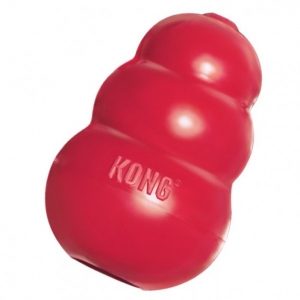 I suggest all puppy owners feed exclusively from frozen enrichment toys like Kongs. Soak the kibble in water and then put it in the Kong and freeze. This provides mental enrichment and uses their jaws and fulfils that need to chew. Your puppy is teething so this should make her gums feel better as well.
I suggest all puppy owners feed exclusively from frozen enrichment toys like Kongs. Soak the kibble in water and then put it in the Kong and freeze. This provides mental enrichment and uses their jaws and fulfils that need to chew. Your puppy is teething so this should make her gums feel better as well.
Take a little time every day to train your puppy. Wait, stay and leave it are great cues to teach impulse control and polite manners. Not only does training teach the puppy how we expect them to behave and gives a means of communication but it also is mental stimulation to help with tiring them out.
Another really big part of the puzzle is play with other puppies and dogs. Singleton puppies that are removed from the litter too soon often have an issue with mouthy behavior. Dogs playing with other dogs helps teach bite inhibition, helps tire them out and provides socialization that is critical to having a dog that gets along well with a variety of dogs. Consider enrolling in a puppy play time class, dog day care or making play dates with dog friendly dogs. You might notice I left out dog parks as they are not an appropriate place to socialize a puppy. You need to know the dogs your puppy is playing with can tolerate playing with a puppy.
One thing that a lot of people are not aware of is that we need to teach our puppies bite inhibition. This means that we teach the dog to use less and less pressure over time when mouthing. Rather than immediately saying “no” every time the puppy mouths you, you start out by only saying it when the puppy mouths hard enough to hurt. Then over time allow the puppy to use less and less pressure to trigger a time out until you eventually no longer allow the puppy to put her mouth on you at any time. The purpose of this training is that if the dog for some reason in the future were to bite out of fear, she would not use a significant amount of bite pressure and therefore would not injure the person.
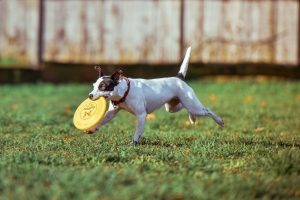 When she does become mouthy, try to redirect her. You can try a plush or tug toy to engage her in biting that or tugging. If you have begun working on manners training, have her do a behavior or several in a row to get her focused and into her thinking brain. If she is getting out of control at some points, I would suggest some short time outs to let her calm down. Say “oops” and turn your back on her for several seconds when she bites too hard. Or you can put her in a puppy pen or another puppy safe time out area. Calmly get up and leave the area or walk the dog to the time out area. It doesn’t need to last more than a couple minutes and we don’t want to get upset. It should be done neutrally. The purpose is to let the dog calm down and to stop playing with her when she is already worked up. She should learn that her mouthing behavior makes playtime stop.
When she does become mouthy, try to redirect her. You can try a plush or tug toy to engage her in biting that or tugging. If you have begun working on manners training, have her do a behavior or several in a row to get her focused and into her thinking brain. If she is getting out of control at some points, I would suggest some short time outs to let her calm down. Say “oops” and turn your back on her for several seconds when she bites too hard. Or you can put her in a puppy pen or another puppy safe time out area. Calmly get up and leave the area or walk the dog to the time out area. It doesn’t need to last more than a couple minutes and we don’t want to get upset. It should be done neutrally. The purpose is to let the dog calm down and to stop playing with her when she is already worked up. She should learn that her mouthing behavior makes playtime stop.
The bad news is that the mouthing will probably be something you are dealing with for at least a few more months but it should start to happen less and less. With some dogs it becomes worse around adolescence as they are testing their limits and have a lot of energy. It’s important to work on rules, structure and manners now so that will be in place for that difficult time. The potty training can go quite quickly if you are extremely diligent about supervision and reinforcing correct behaviors. There is a light at the end of the tunnel but it is going to take some time and work to reach it.
Until next time,
Crystal

